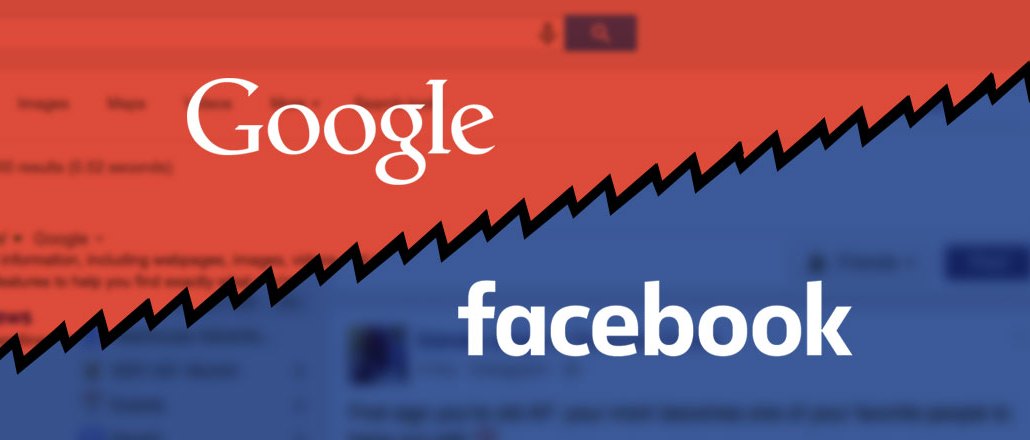Secure your place at the Digiday Media Buying Summit in Nashville, March 2-4
The ‘f’ and the Alphabet: The key difference in Google and Facebook’s branding

Richard Jackson is a business writer and the founder of Watch My Competitor, a business intelligence service that monitors rival web activity for its clients.
Google and Facebook have much in common. They are the first and second most-visited websites in the world, they are both free online services that make their money through advertising, and they have both faced similar criticism for their privacy policies.
Yet the branding is a different story. While Zuckerberg has released a new series of TV spots and billboards for the Facebook brand, Page is happy to let Google be “slimmed-down.” The search giant is now owned by Page’s new company, Alphabet, and all of Google’s non-Internet investments will go through them. However, it will still remain the highest ranked website and most powerful search engine in the world. From a customer perspective, Google will look as it always has. From a business perspective, Google is 90 percent of what it used to be.
Alphabet, on the other hand, will grow and wield its new power in silence. Indeed, this has already happened. Ignoring the news stories about Alphabet, the company’s own website is surprisingly hard to find on Google — “Alphabet” is not very SEO-friendly, after all. This is especially surprising considering that Alphabet owns the very search engine used to conduct said search. In fact, another company called Alphabet appears before them. Anybody with a basic grasp of digital marketing knows that making sure your company is seen before others in search results is essential. Yet, with Alphabet, not being seen is the whole point.
Frustrated with the overwhelming presence of Starbucks, your average coffee aficionado may shun the faceless conglomerate for the charm of somewhere independent. But Starbucks has foreseen this already and now owns many “independent”-looking coffee places that don’t use the green siren logo or the Starbucks name anywhere. So it is with Alphabet. Rather than plastering the Google logo over every business that Page wants to enter into, he will use the barely visible Alphabet parent brand instead. With one swift corporate shakeup, Page seems to be able to have his cake and eat it too in a move that some are calling “pure genius.”
All of this could not be more different from Facebook’s plan. Rather than preparing for diversification, in the way that Alphabet allows Page to do so, Zuckerberg is intent on unifying the Facebook brand with a single lowercase “f.” Aside from recent purchases Watsapp and Instragram, everything Facebook uses the Facebook “f.” That “f” is the same single letter that Facebook used to identify itself in their new advertisements.
No longer is their ad campaign about a long rambling monologue where the word “Facebook” is used a gazillion times. The old ad from 2012 compared Facebook to a chair, a great nation and then — and it’s hard not to laugh by this point — the entire universe. This lesson in how not to advertise has, unsurprisingly, been taken down by the official Facebook account. But you can still watch it here.
Now, Facebook appears to have learned its lesson and have a new aim. In 1998, it was reported that the Nike Swoosh was recognised by 97 percent of Americans. In 2011, it was reported that the Coca-Cola logo was recognized by 94 percent of people globally. In 2020, it’s a fair bet that 90-odd percent of people globally will also recognize the Facebook “f.” Far from being the silent power that Alphabet wishes to be, Facebook’s aim to become instantly recognizable. Alphabet allows Page to become quieter; the “f” allows Zuckerberg to become louder.
More in Media

From feeds to streets: How mega influencer Haley Baylee is diversifying beyond platform algorithms
Kalil is partnering with LinkNYC to take her social media content into the real world and the streets of NYC.

‘A brand trip’: How the creator economy showed up at this year’s Super Bowl
Super Bowl 2026 had more on-the-ground brand activations and creator participation than ever, showcasing how it’s become a massive IRL moment for the creator economy.

Media Briefing: Turning scraped content into paid assets — Amazon and Microsoft build AI marketplaces
Amazon plans an AI content marketplace to join Microsoft’s efforts and pay publishers — but it relies on AI com stop scraping for free.





